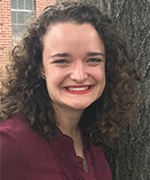|
 Hannah Early, anthropology graduate student, worked with Le Bonheur Community Health and Well-Being
on the Green Healthy Homes Initiative (GHHI). The primary goal of GHHI is improving
health outcomes by improving housing conditions. Hannah Early, anthropology graduate student, worked with Le Bonheur Community Health and Well-Being
on the Green Healthy Homes Initiative (GHHI). The primary goal of GHHI is improving
health outcomes by improving housing conditions.
 Austin Harrison, public and nonprofit administration graduate student, was Neighborhood Preservation
Inc. (NPI). He was involved in many aspects of NPI's work, from board meetings to
tree plantings to participating in city-wide projects like Memphis 3.0 and the Bluff
City Snapshot 2.0 parcel survey. Austin Harrison, public and nonprofit administration graduate student, was Neighborhood Preservation
Inc. (NPI). He was involved in many aspects of NPI's work, from board meetings to
tree plantings to participating in city-wide projects like Memphis 3.0 and the Bluff
City Snapshot 2.0 parcel survey.
 Laura Kirk, a Social Work graduate student, was a fellow with Clayborn Reborn, a partnership
working to restore the historic Clayborn Temple. She helped the organization pursue
grant funding and plan "pre-vitalization" events that reintroduce the public to the
historic structure. Laura Kirk, a Social Work graduate student, was a fellow with Clayborn Reborn, a partnership
working to restore the historic Clayborn Temple. She helped the organization pursue
grant funding and plan "pre-vitalization" events that reintroduce the public to the
historic structure.
 Jackson McNeil, a City and Regional Planning graduate student, worked with BLDG Memphis (Build.
Live. Develop. Grow.). McNeil assisted BLDG Memphis promoting community engagement
for the Memphis 3.0 comprehensive plan. Jackson McNeil, a City and Regional Planning graduate student, worked with BLDG Memphis (Build.
Live. Develop. Grow.). McNeil assisted BLDG Memphis promoting community engagement
for the Memphis 3.0 comprehensive plan.
 Sumita Montgomery, anthropology graduate student, worked with United Campus Workers (UCW) on the Tennessee
is NOT for Sale campaign. Montgomery helped track political and legislative changes
and engage in community outreach. Sumita Montgomery, anthropology graduate student, worked with United Campus Workers (UCW) on the Tennessee
is NOT for Sale campaign. Montgomery helped track political and legislative changes
and engage in community outreach.
 Dustin Shane, city and regional planning student, was assigned to Frayser Community Development
Corporation. He worked closely with the Police Joint Association (PJA) and Frayser
resident activists, to collect data about problem properties and other code issues
like boarding up houses, overgrown weeds, and bulky trash pick-up. Dustin Shane, city and regional planning student, was assigned to Frayser Community Development
Corporation. He worked closely with the Police Joint Association (PJA) and Frayser
resident activists, to collect data about problem properties and other code issues
like boarding up houses, overgrown weeds, and bulky trash pick-up.
 Aubrey Toldi, city and regional planning graduate student, worked with Clean Memphis. Clean Memphis
helps identify code enforcement issues, keep public green spaces clean and provide
environmental education. She was responsible for assisting with fundraisers and working
with community leaders. Aubrey Toldi, city and regional planning graduate student, worked with Clean Memphis. Clean Memphis
helps identify code enforcement issues, keep public green spaces clean and provide
environmental education. She was responsible for assisting with fundraisers and working
with community leaders.
 Kala Wilson, public and nonprofit administration graduate student, has spent the year working
with The Heights CDC. She conducted an inventory of the Heights area properties to
identify code violations and tracked property vacancies and sales to enable the Heights
to target properties for remodeling, rehabilitation and/or removal. Kala Wilson, public and nonprofit administration graduate student, has spent the year working
with The Heights CDC. She conducted an inventory of the Heights area properties to
identify code violations and tracked property vacancies and sales to enable the Heights
to target properties for remodeling, rehabilitation and/or removal.
|